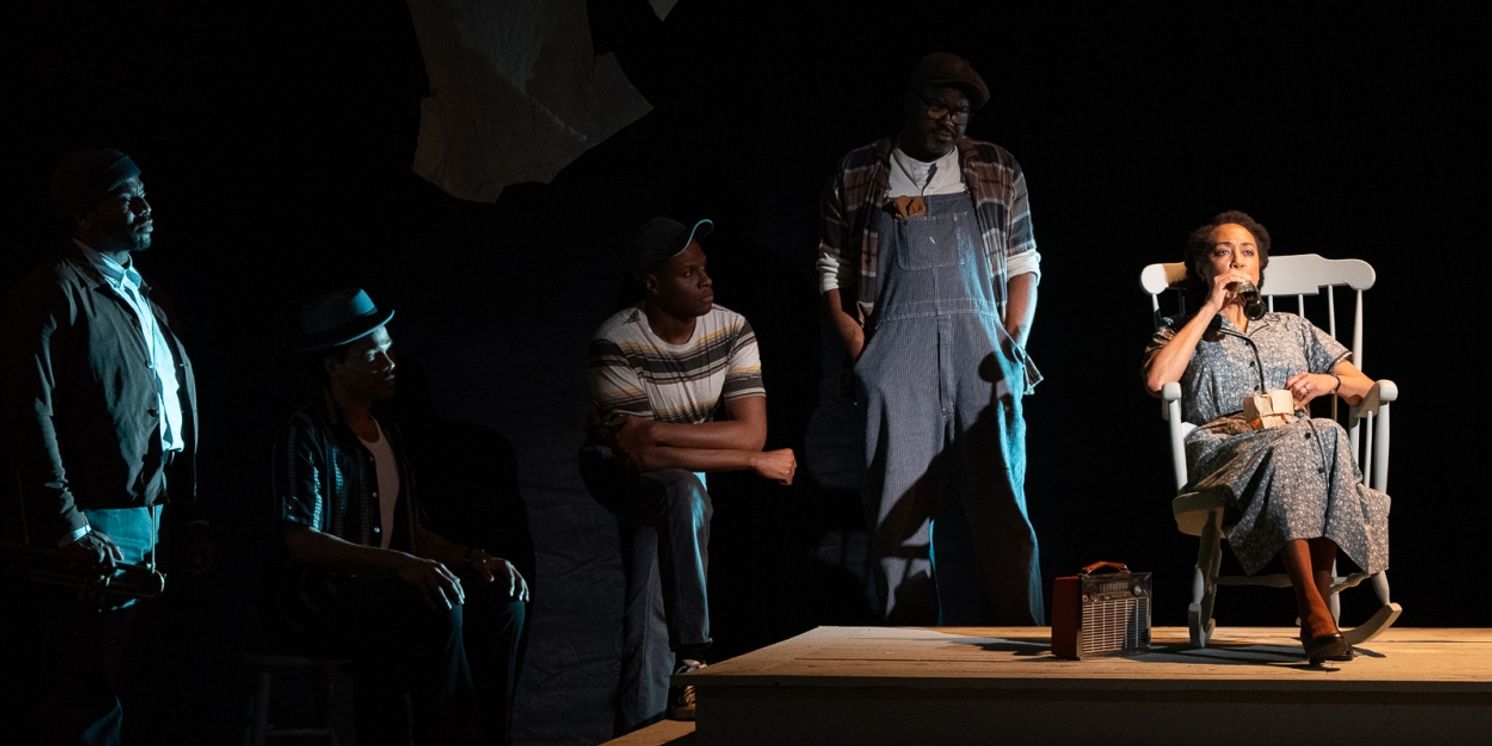Review: FENCES at Trinity Rep
FENCES at Trinity Rep: Crisp production of the August Wilson classic

Trinity Rep has long been known for its productions of the works of August Wilson, one of the leading American dramatists. This latest entry, Fences, marks a return to a show they originally staged in 1992, and they have assembled a talented cast who truly inhabit these complex roles, bringing Wilson's words to life in a powerful evening of theater.
Fences is the 1950s entry in his ten-play "Century Cycle," which explores the Black experience as it evolved over the twentieth century. This play, set as it is in the economic afterglow of WWII, highlights the struggles Black Americans experienced trying to attain the American Dream (or, even, getting to drive the truck). This is not the Fifties of a white tv sitcom suburb; we are with Troy Maxon and his family in a run-down house off an alley in the big city.
Troy (Kelvin Roston Jr.), once a star in the Negro Leagues, is now an aging garbage collector, living paycheck to paycheck. His wife, Rose (Trinity Rep company member Jackie Davis) keeps the house going on his meager pay, humors and banters with Troy, puts up with his eccentricities, and tries to speak up for their son, Corey (Brown/Trinity Rep student Nicholas Byers), who wants to play sports like his dad. Troy's older son, Lyons (Rodney Witherspoon II) is a musician who most often appears with his hand out on payday. There's a long-suffering friend, Jim Bono (Dereks Thomas) and Troy's brother Gabriel (Martinez Napoleon) who came back from the war with a traumatic brain injury. A young girl, Raynell, is played by Felese Kparyea and Blair Pierre.
All of the actors do a fine job. Roston's Troy allows us to see the vulnerability beneath his swagger, and his evolution as a father and stand-your-ground fighter are finely observed. Martinez Napoleon plays Gabriel with a haunting empathy, from the traumatic contraction in his hands to his glazed affect, he is heartbreaking. And while the character of Bono could seem a bit of a comic foil, Thomas brings so much to the part that we root for him, and that makes his second-act turn even more affecting. But the standout is Jackie Davis's Rose. She has a supple, nuanced characterization that can flex from earthy to motherly to stone-cold on a dime, and it is truly impressive to watch. There were moments in the second act where she had the audience gasping when she delivered a line.
Some of that is down to Wilson's astonishingly beautiful prose, to be sure, but credit is due to the whole ensemble and director Christopher Windom, whose coherent vision and commitment to the truth of the show is evident. We really believe these actors, and this is one of those plays where you can find yourself falling through the "as if," completely absorbed in what's happening. Windom uses the entire half-round of the intimate Dowling Theatre's concrete floor, as well as the aisles, to bring the action right up and into the audience, and it is utterly absorbing.
The technical aspects are well executed. Elton Bradman's sound design is subtle (until it's not) and effective, and Marika Kent's lighting is superb; a great fit with with the broad expanse of the stage, using isolation, colors, and side lighting to particularly good effect. Kenisha Kelly's costumes work well.
It's not a perfect show. While the set design is crisply executed, Lex Liang's vision -- an array of of household items suspended from the ceiling, spread out in an arc, as if whirled by a tornado -- may strike some as a bit out of sync with the realism of Wilson's script. Particularly when some of the objects light up with tiny green LEDs. However, it absolutely does, on entering the theatre, create a memorable frame for the action, and Kent's lighting of the objects -- and how that evolves over the evening -- is unquestionably stunning. While the fight choreography was a bit uncoordinated on opening night, it will undoubtedly improve during the run.
For folx who want to see Wilson's work live, this is a solid production with some brilliantly crafted moments. You'll have a compelling two-hours-twenty with a talented cast who understand and vitally inhabit Wilson's beautiful words, and what you experience will be a powerful authenticity. Worth seeing.
Fences, by August Wilson, directed by Christopher Windom. Through April 28. Tickets ($24-$83) by phone at (401) 351-4242, online at www.trinityrep.com/fences, and at the box office, 201 Washington Street, Providence. For more information on special pricing for RI residents, sensory performances, and masked matinees, see the web site.
Photo by Marisa Lenardson.
Reader Reviews

Videos

